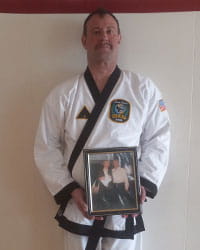Unilateral Renal Agenesis
Martial arts has been a passion of David’s since he was 12 years old – he received a black belt after years of strenuous training and has continued the sport into adulthood. However, after nearly two decades of practicing martial arts, he had to step off the mats due to an unexpected condition.
In early 2011, David began noticing abnormal levels of fatigue, which was unusual for the former firefighter and martial arts black belt. He went to his doctor who performed various tests. After the tests, which included blood work and an ultrasound, David’s doctors discovered that he only had one kidney, a condition known as unilateral renal agenesis.
Unilateral renal agenesis is a congenital condition, which means people who have it are born with it. People with unilateral renal agenesis can live full, healthy lives, especially throughout their childhood. However, the condition may lead to other problems later in life, including heart disease and end-stage kidney disease.
David was in his early 30s when doctors discovered his condition in 2012. He had developed end-stage kidney disease and was immediately put on dialysis, a treatment to filter waste and other toxins out of the blood when the kidneys don’t function properly.
Dialysis is a time-consuming and tiring process. Every day for three-and-a-half hours, a machine filtered all the blood in David’s body – it essentially took over his kidney function.
“I ended up doing five years of dialysis,” David said. “I moved in with my mom and dad and was doing dialysis in the town that they live in, and I finally said to myself, ‘This is not a life.’ I can’t be hooked up to a machine three-and-a-half hours a day.”
In 2016, in collaboration with his care team in Ohio, David began the kidney transplant evaluation process. Kidney transplant is a life-saving treatment option for end-stage kidney disease, chronic kidney disease, and other renal conditions.
The Journey to UPMC: A Weight off His Shoulders
The UPMC Kidney and Pancreas Transplant Program is one of the most active and experienced of its kind in the United States. Once somebody is referred to the program, UPMC experts review their medical history and perform a thorough evaluation to assess whether that person is a good candidate for a kidney transplant.
David’s case was accepted and he was added to the kidney transplant waiting list in March 2016. In early August that same year, he got the call from his UPMC care team that a kidney had become available for him – a call that took weight off David’s shoulders.
“It made me feel relieved that I hopefully didn’t have to continue dialysis,” David said. “I was praying that everything would work out with the transplant.”
He and his family drove from their home in Ohio to UPMC in the middle of the night, and David was off to surgery the next morning.
David’s grateful for the care he received at UPMC.
“My care team was very professional, and they were very good to me,” David said.
The Result: Back on the Mats
David underwent a kidney transplant at UPMC. The first few weeks of his recovery were overwhelming for him – not only did he need to recover from the surgery, but he also needed to get used to his new medication schedule. These medications include immunosuppressants, which prevent your body from rejecting its new kidney after a transplant.
Yet he’s grateful for his family, who provided invaluable support throughout the entire process.
“Thanks to my wonderful wife, she helped me with my medications, and my mom was there to help as well,” David said.
Since his kidney transplant, David’s energy levels have gradually increased. He’s enjoying life without dialysis and focusing on taking care of his kidney.
Even though five years of dialysis and recovery from transplant forced him off the mat, his passion for martial arts never faded.
“I was adamant about getting back on the martial arts mats again,” David said. “I wanted to see if I could handle the strenuous workouts again.”
In 2019 – seven years after his initial diagnosis of unilateral renal agenesis – he did just that. While taking proper precautions and under careful supervision (his instructors and peers know that they cannot hit anywhere near his kidneys), David returned to martial arts. Six years after his transplant at UPMC, on Oct. 22, 2022, he earned his black belt back.
David’s treatment and results may not be representative of other cases.

















